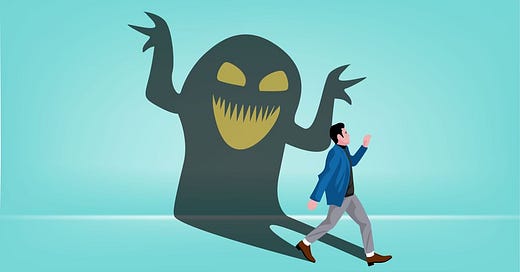Dearest Readers,
Welcome to AH’s first summer series!
It can be argued that summer is the most social time of the year and the one thing that may be keeping us isolated and indoors is shame!
So for the next three months, AH is going to be breaking down this intense barbarian into digestible bites so we can all lean into a little inner homework…🫶🏻
For any human, shame is our kryptonite. It’s toxic to our well-being. It immediately weakens our innate gifts, and if it’s around too long it wipes out our confidence and ultimately our authentic existence.
Brené Brown, a renown Research Professor of Social Studies at the University of Houston, defines shame as, “…the intensely painful feeling or experience of believing we are flawed and therefore unworthy of acceptance and belonging. Shame creates feelings of fear, blame and disconnection.”
We might think that we developed this awareness as kids on the playground or during the teen-meanie stage, but developmental psychology research estimates that self-consciousness begins around two years old.
And Brené points out that, “many of our early shame experiences, especially with parents and caregivers, were stored in our brains as traumas.”
This is why shame can have some deep, subconscious roots planted in us! This was prime time when the soil of our identities were ripe for development. It shaped those sensitive nerve endings of:
Too fat
Not smart
Not attractive
Not talented
“Shame is the voice of perfectionism.” And that is why it, “tends to lurk in all of the familiar places, including appearance and body image, family, parenting, money and work, mental and physical health, addiction, sex, aging and religion.”
“When we are in shame we are often overcome with the need to hide or protect ourselves by any means possible.”
In fact, in the field of mental health, shame is known as a “master emotion.” “…shame unconsciously drives thoughts, feelings and behaviors.” It is so powerful it influences our ability to reason, controls our conduct, and makes isolation feel luxurious.
“[It] can fundamentally change who we are and how we approach the world.”
When this monster has its clutches on us it itemizes where and how we’re flawed in comparison to others. It scares the bejeezus out of us to venture out and be at the mercy of the unknown, vulnerable to an attack of ridicule or rejection.
It convinces us to anticipate that all of our imperfections will be in the spotlight at centerstage for everyone to witness.
They’ll clock how much weight we’ve put on, how we’re not as sharp as we believe we should be, or how we just never have it together. And because of these insecurities we have no chance of being accepted, or belonging amidst civilization.
We believe we’re better off being invisible. Ultimately we conclude it’s just easier to keep company with the monster…
Shame’s formulas is:
We’re fearful of judgement and criticism + We blame ourselves for being flawed = We disconnect from others.
It only takes one aspect of ourselves to produce a sense of shame yet it informs almost all of our actions, all day, every day.
We may think that listening to shame keeps us safe but it actually keeps us small, hidden, and feeding on fake news…
This monster robs us of everything that’s beautiful about having a human experience; to feel love, connection, happiness, and joy.
The call to arms, fellow Homo sapiens: It is imperative that we seek out where this beast resides in our being and we commit to slaying it!
Author’s Note: This series is based on Brené Brown’s book, I Thought it was Just Me (But It Isn’t). Besides the other reference links, the quotes here are excerpts from it.









Scary to think I resonate.. I was thinking more on the lines of low self-esteem, but perhaps shame is more adequate in some of my stories.. those untold ones.
This piece was so spot on, cannot wait for the rest of the series.